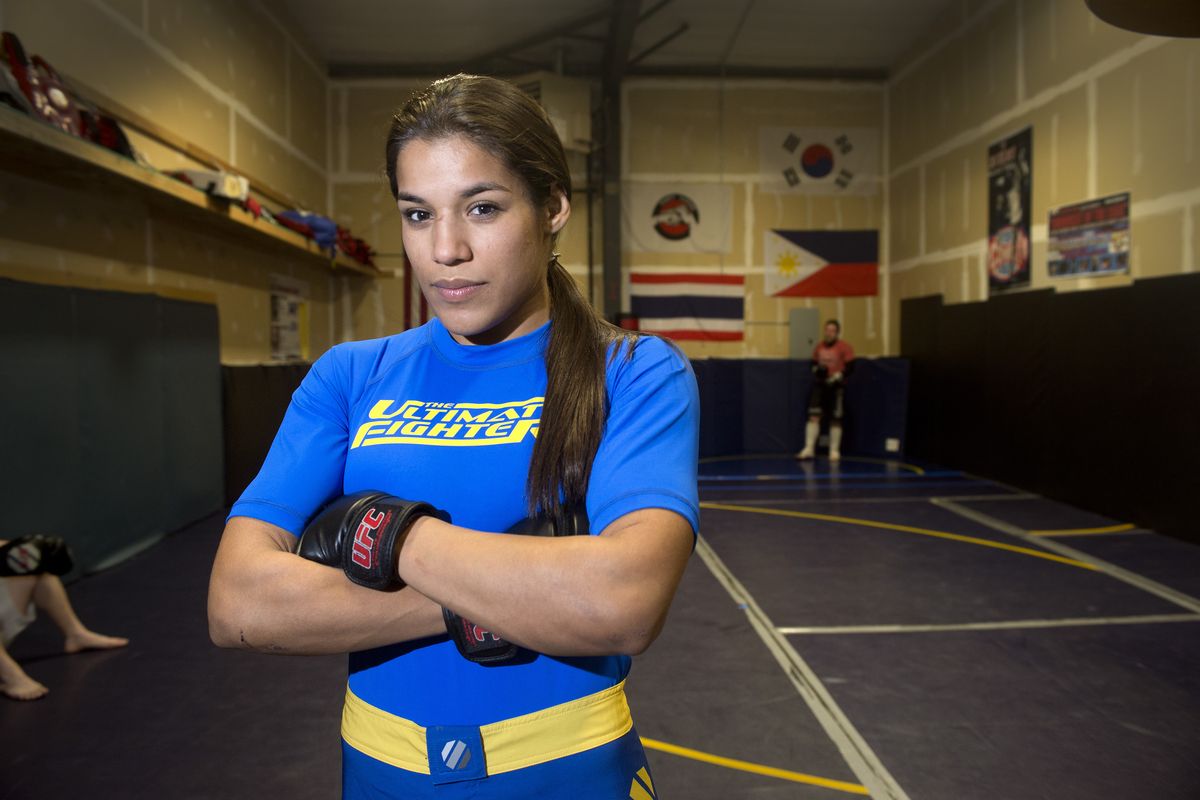Pena, who broke arm rather than quit, is indeed The Ultimate Fighter

Wherever her success in mixed martial arts takes her, this story will be the one they tell about Julianna Pena: The one in which she broke her arm rather than surrender.
The 24-year-old Spokane woman now rides atop the MMA world after becoming the first female winner of The Ultimate Fighter last weekend, a hard-scrapped distinction with the historical footnote that a little gym in north Spokane has now produced two show champions in the space of 18 months.
But her rather savage run through that octagonal soap opera will never quite define her quite so neatly as the broken arm. So here’s the abridged version.
It was 20 months ago, and the Spokane bantamweight was training for a bout at Northern Quest Casino against Sarah Moras of Kelowna, B.C. Fifteen days before the card, Pena was hit by a drunk driver downtown, breaking her nose and sustaining other injuries, including to her back – and yet she declined to pull out. Moras, nominally a featherweight, carried a significant weight advantage and controlled the fight, finally working an armbar on Pena.
Who refused to tap out.
One pop was heard, then a second and a third.
No tap.
Eventually, a doctor stopped the fight on a TKO – Pena’s first pro loss after four victories. Her broken arm would knock her out of training for eight months, and she’d lose again the next time she climbed back into the cage.
“Stupidity, maybe,” Pena said when asked why she hadn’t quit. “I’m a really stubborn person.”
And so while few MMA observers figured Pena would be the survivor of TUF’s first female wingding – despite being coach Miesha Tate’s first pick – her Spokane coach, Rick Little, had no doubt.
“When you have these women messing with each other’s food, whining about injuries and all that stuff going on in the house, I knew she was going to excel,” said Little. “She wasn’t going to break mentally to those girls.”
Indeed, Pena’s borderline unhealthy toughness stood apart even more against the backdrop of nuclear cattiness and excuse-making that marked TUF’s foray into coed TV. Sometimes it seemed more “Real Housewives” than UFC.
When world-ranked bantamweight Shayna Baszler was choked out by Pena in the show’s first match, Baszler alibied that it was because “she fought for her life and I didn’t.” When Moras was bloodied and submitted in their rematch, she complained that TUF bouts “weren’t fun fights … what is the point if you aren’t having fun?” By the time Pena overwhelmed boxer Jessica Rakoczy in the finale, viewers may have wondered if Pena’s opponents had signed up not to care.
Not that Pena was above creating some drama herself – she was acclaimed as the “most annoying person in the house,” by one TUF contestant.
“I either get a lot of love or a lot of hate – either way I’m OK with it,” she said. “As long as they’re talking. I’m in the fighter business.”
The perfect match between work and worker seems like the next best thing to having a soulmate, and Julianna Pena found it.
By accident.
“When I was growing up, I thought I was tough,” she said, “but I thought maybe it was just because I looked mean and had a lot of attitude and was all, ‘Don’t mess with me or I’ll kick your ass.’ ”
Then in 2008 her sister invited her to a cardio kickboxing class at Little’s Sik-Jitsu Fighting Systems gym, and impressed the coach with punching technique that suggested a 10-year veteran. She was no less precocious as a grappler, and soon enough Little discovered her most ridiculous attribute: a lack of fear.
“We’d do choke drills and the girl wouldn’t tap,” Little said. “She’s been asleep in my gym more than anyone from refusing to give up.”
A graduate of Mt. Spokane High School, Pena had played sports as a kid “but I was always on bad teams. I didn’t like to lose. In MMA, you’re on your own and that’s more for me.”
Ernie and Pamela Pena weren’t so sure. Parents aren’t likely to be wild about their daughter getting hit in the face, and as other injuries piled up – a torn ACL, a meniscus – Pena was tugged away from the sport more than once to return to school until she finally made a stand.
More attitude.
“It comes from being the baby of four kids and getting the short end of the stick,” Pena laughed. “And a lot of it I got from my mom and dad – they’re both spunky and opinionated. My mom would always tell me, ‘Stand up for yourself.’ It got me in trouble a few times. I put my foot in my mouth a lot.”
She’s still standing up. In Las Vegas, she got into a verbal war with Ronda Rousey, the sport’s resident queen who coached the TUF 18’s rival team.
“She wants to act all real and hard, but when she had something to say, she said it behind my back,” Pena explained.
There wasn’t much to say after Pena’s annihilated every opponent put in front of her, and now she’s eager to do it again as a UFC-rostered fighter.
“This taught me to believe in myself – that I’m a dangerous girl to get in the cage with,” she said. “I’m going to hurt you, or die trying.”